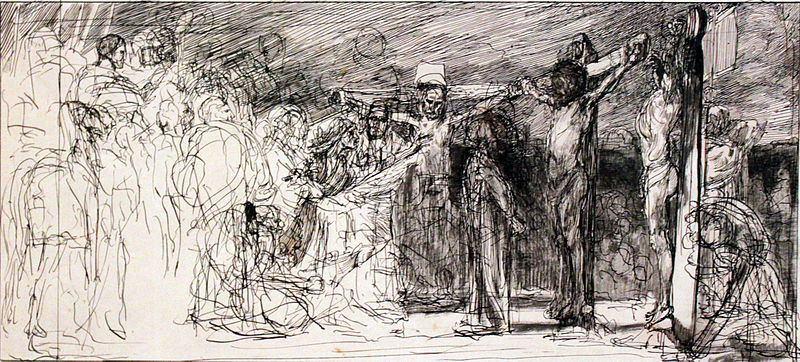Gesualdo, Tenebrae Factae Sunt
 It’s Good Friday. Our selection for this week is, I think, an astonishing work beautifully performed and recorded. Before you read on, listen to the music and read the text. Better yet, listen twice (as I always recommend), especially if you do not already know this work. Then, if you wish, read the commentary below.
It’s Good Friday. Our selection for this week is, I think, an astonishing work beautifully performed and recorded. Before you read on, listen to the music and read the text. Better yet, listen twice (as I always recommend), especially if you do not already know this work. Then, if you wish, read the commentary below.
| Tenebrae factae sunt, dum crucifixissent Jesum Judaei: et circa horam nonam exclamavit Jesus voce magna: Deus meus, ut quid me dereliquisti? Et inclinato capite, emisit spiritum. V. Exclamans Jesus voce magna ait: Pater, in manus tuas commendo spiritum meum. Et inclinato capite, emisit spiritum. |
Darkness fell when the Jews crucified Jesus: and about the ninth hour Jesus cried with a loud voice: My God, my God, why hast thou forsaken me? And he bowed his head and gave up the ghost. V. Jesus cried with a loud voice and said, Father, into thy hands I commend my spirit. And he bowed his head and gave up the ghost. |
I have recommended listening before reading because I think the music deserves to be heard on its own terms. Commentary on music should enhance the listening experience by providing some relevant context and explanation. But writing about Carlo Gesualdo (1566-1613) tends to cause distractions.
The one fact that everyone seems to know about Gesualdo is that he murdered his wife and her lover. The details do not soften the deed. He was 24 at the time. There was no question that he committed the act, but it was determined not to be a crime. He was also Prince of Venosa and Count of Conza. He lived in isolation but had the wealth to surround himself in his castle with musicians.
Gesualdo would qualify as idiosyncratic purely on music grounds without the biographical information. He experimented with [then] modern techniques and carried the late Renaissance style into an extreme level of chromaticism that would not be heard again until the late Romantic era.
He focused on expressing the text. From the beginning of this work you hear “tenebrae” (darkness) in the lowest register. He expresses the agony of “why have you forsaken me” with a greater independence of voices, each part seeming to go its own way. Contrast that with the unity of voices on “into thy hands I commend my spirit.” A series of descending lines paints “bowed his head.” If you listen, you will likely hear more examples.



